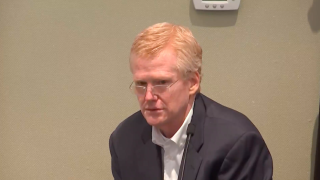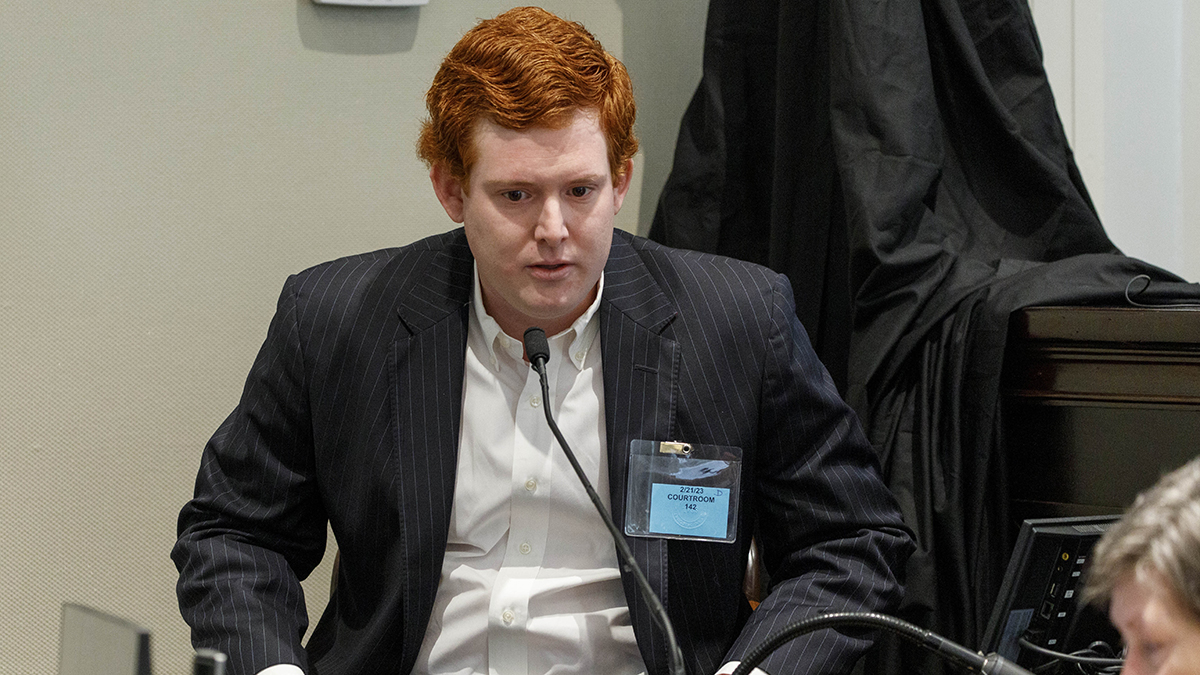
Disgraced South Carolina attorney Alex Murdaugh faced intense questioning about his movements the night his wife and son were killed as the prosecutor challenged inconsistencies in his memory Friday at his double murder trial.
A day after revealing for the first time that he was at the kennels where his wife and son were shot shortly before they died, Murdaugh returned to the stand in his own defense. During cross-examination, prosecutor Creighton Waters grilled Murdaugh about what he repeatedly called the once-prominent lawyer's “new story” about what happened at the kennels on the evening June 7, 2021.
Waters asked Murdaugh if he meant what he told the jury Thursday — that he tried to help police find the killers.
“Other than lying to them about going to the kennels, I was cooperative in every aspect of this investigation," Murdaugh said.
Get top local stories in DFW delivered to you every morning. >Sign up for NBC DFW's News Headlines newsletter.
“Very cooperative except maybe the most important fact of all, that you were at the murder scene with the victims just minutes before they died," Waters replied.
For 20 months, Murdaugh insisted that he was never at the kennels. But after more than a year, state agents hacked his son’s iPhone and found a video with Alex Murdaugh’s voice less than five minutes before the victims stopped using their cellphones and prosecutors think they were shot.
Murdaugh, 54, is charged with murder in the deaths of his wife, Maggie, 52, and their 22-year-old son, Paul, but has steadfastly denied any involvement. He faces 30 years to life in prison if convicted.
Waters ended his cross-examination by rattling off the names of about four dozen people — starting with Maggie and Paul Murdaugh and running through his family, friends, law partners, clients and police. He asked Alex Murdaugh if he lied to them and Murdaugh agreed on most.
“And you want this jury to believe a story manufactured to fit the evidence that you brought forth just yesterday after hearing a trial’s worth of testimony?” Waters asked.
The prosecutor then showed body camera video of the first officer to respond to the shooting. With the bodies of his wife and son visible, Murdaugh said he hadn’t seen them for 45 minutes before he left his home.
Waters also pushed Murdaugh for more details about what happened during the kennel visit, noting that this was all new to investigators since he only admitted it in court Thursday.
The timing, including cellphone and car-tracking data, is a key component. The video ended just before 8:46 p.m. and both Paul and Maggie Murdaugh stopped using their cellphones about three minutes later.
Murdaugh couldn't remember how long he was at the kennels, whether he got blood on his hands pulling a dead chicken from a dog's mouth or the last words he would ever say to his son and his wife.
“There would have been some exchange,” Murdaugh said.
Waters said it appeared Murdaugh remembered a lot of specifics when the details were critical, but not when they might get him in trouble.
“You disagree with my characterization that you have a photographic memory about the details that have to fit now that you know these facts but you're fuzzy about the other stuff that complicates that?" Waters said.
For the first time, Murdaugh blamed anger on social media aimed at his son for the killings. Paul Murdaugh had been involved in a boat wreck that killed a teenager and was charged with boating under the influence. He mentioned the boat crash when the first investigators asked if he could think of any suspects.
Murdaugh said his son was the subject of vile “half-truths, half-reports, half-statements, partial information” online.
“I believe then and I believe today that the wrong person saw and read that because I can tell you for a fact the person or people who did what I saw on June the 7th — they hated Paul Murdaugh and they had anger in their heart,” Alex Murdaugh said.
Waters told Murdaugh that explanation defied logic, asking if Murdaugh was telling the jury that his wife and son were killed by random vigilantes who knew “they would be at the kennels alone on June 7, knew that you would not be there, but only between the times of 8:49 and 9:02.”
“You've got a lot of factors in there, Mr. Waters, all of which I do not agree with, but some of which I do,” Murdaugh said.
Murdaugh said Friday that after the brief kennel visit, he returned to the family's house about 1,150 feet away on a golf cart, lay down for a few minutes and then got up to get ready to visit his ailing mother about 9:02 p.m., a time verified by step data on his cellphone, which he didn't take to the kennels.
Waters asked Murdaugh if a flurry of steps and a series of unanswered phone calls he started making to his wife and son at 9:02 p.m., after no activity was detected on his phone for nearly an hour, was a way a lawyer and volunteer prosecutor could begin crafting a story to show he couldn’t be the killer.
“I never manufactured any alibi in any way shape or form because I did not and would not hurt my wife and my child.”
Prosecutors have said Murdaugh killed his wife and son to gain sympathy to buy time because his financial misdeeds were about to be discovered. During his testimony, he has admitted to stealing from clients.
Murdaugh is charged with about 100 other crimes, ranging from stealing from clients to tax evasion. He is being held without bail on those charges, so even if he is found not guilty of the killings, he will not walk out of court a free man. If convicted of most or all of those financial crimes, Murdaugh would likely spend decades in prison.



